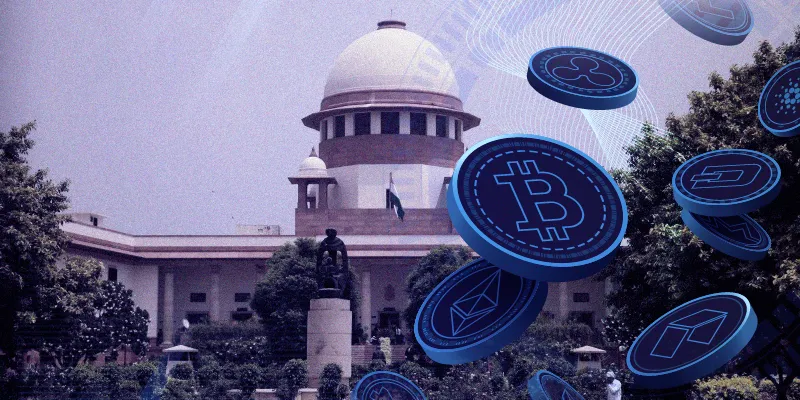With cryptocurrency back in the field, new ground opens for startups and investors to innovate
The Supreme Court’s decision to lift the ban on cryptocurrency trading has come as a booster shot for startups, entrepreneurs, and investors to reinvigorate this ecosystem.
The gates are now wide open for the emergence of a new breed of entrepreneurs from the world of cryptocurrency in India as the legal shackles withholding them are now broken.
The impact of the Supreme Court’s ruling on lifting the ban on cryptocurrency trading in India opens up innumerable possibilities that were waiting to be explored.
For starters, the court’s decision naturally lifts the confidence of the entrepreneurs, who had startups in this segment but had to go through a challenging two years. Some even shut down operations ever since the Reserve Bank of India (RBI) prohibited banks from dealing with cryptocurrency.
Harish B V, Co-founder of , a bitcoin company said, “I am super excited as a founder and an individual petitioner as well for this Judgement after this long two-year journey. This judgement opens the door for millions of Indians to invest/buy/sell crypto via bank accounts in a safe and responsible manner.”
Boost to startups
Hopes have risen that a greater number of entrepreneurs will emerge from the cryptocurrency segment with support from the investor community.

Raghu Mohan, CEO and Co-founder, IBC Media, says, “This will be a step forward to empower entrepreneurs who build innovative business models to solve multiple grassroots problems in India using crypto. It emboldens them to revive their contribution to wealth creation for the country.”
It has been a two-year battle for the crypto industry in the courts and the Internet and Mobile Association of India (IAMAI) was among one of the key petitioners.
Rashmi Deshpande, Partner, Khaitan & Co, who was representing one of the petitioners, says, “It is definitely a historical decision and will define India as a nation supporting new-age technology and new ways of doing business.”
Argument in court
The petitioners based their argument that the ban on crypto is unconstitutional. Further, the petitioners, led by IAMAI, said that the Circular from RBI – curbing banking pipelines to crypto platforms – was released without studying the intricacies and the impact it would have on crypto platforms.
One of the petitioners, on condition of anonymity, says, “Article 19 1 (G) of the Constitution was the main line of the argument and was put forward by the petitioners, which allows individuals to practice any profession until it is not against public interest.”
There were also arguments that the decision to ban was taken without conducting an independent research exercise.
According to IMAI, the court recognised the power of RBI to take pre-emptive action, it held that the proportionality of such a measure was not there in this case since there wasn’t any damage suffered directly or indirectly by the apex bank's regulated entities as a result of virtual currency trading.
Therefore, among other reasons, the impugned Circular – dated April 6, 2018 – was set aside on the ground of proportionality.
Boost to blockchain
Cryptocurrency is fundamentally based on blockchain technology and the negative environment surrounding this hampered the investment flow into this segment.
A report by Nasscom on Blockchain in 2019 highlighted this issue stating that while venture capital investments in blockchain startups reached $5.6 billion globally, India has so far been able to attract only a small fraction (0.2 percent) of those investments, though the trend is picking up.
Nikola Stojanov, CEO of AE Ventures, said, “The ruling is significant for the Indian crypto market, especially in the startup ecosystem. It instils a sense of confidence about the Indian market among foreign investors like AE Ventures and others and opens a plethora of opportunities for Indian startups and corporates to build innovative solutions using crypto.”
KPMG, in its bi-annual report on global and regional fintech investment trends titled Pulse of Fintech H2’2019, stated that the number of blockchain deals volume dropped significantly from 2018 but the investments were still significant.
It cited the interest in this segment due to Facebook’s cryptocurrency announcement Libra and JP Morgan’s plans for a digital coin for payments.
Linkages with banks
Krupesh Bhat, Founder of LegalDesk.com, says, “Presently, it is too early to imagine that cryptocurrency will replace the money we are familiar with, but it is the currency of the future. Just like how investors are now buying gold-backed securities instead of actual gold, cryptocurrencies have become an asset class of their own in other parts of the world. This move will spur innovation.”
Kartik Mandaville, CEO of Springworks, says, "India has only seen maybe 0.1 percent of all global blockchain investments. This should get a stimulus after today's decision. Blockchain-tech-backed decentralised apps (known as dapps) will have greater adoption from enterprises and consumers with the reversal of the ban from banking sector. The tokens can be used as a rewards mechanism in blockchain apps."
Now, it should spur the whole segment to build strong linkages with the financial services industry.
Benson Samuel, Co-founder, – a bitcoin, which was shut down two years ago, and now Director of Technology at Ajna Digital says, ‘’We will see full-blown launches by certain crypto players, post this decision by the Supreme Court. However, timelines are still to be seen.”
According to Benson, banks in India had no inhibition in dealing with the crypto platforms as it was also a source of revenue.
The key to the expansion of the cryptocurrency and blockchain industry in the country will be the availability of talent. Akshay Aggarwal, Co-founder and Managing Trustee, Blockchained India, says, “The ban was something that blocked such an amazing talent pool to even consider looking into this direction. Now, talent will flow into the direction of crypto."
Key concerns
The key concern around cryptocurrency was how it would bypass the regulators or be put into use for illegal activities. But the industry players are in unison that they need to be regulated especially on the side of anti-money laundering (AML).
Raghu says, “Crypto needs to be regulated in India, and we are all for it. Tax it and bring in KYC and AML measures to avoid any misuse if need be. In fact, regulating crypto is far easier than regulating physical cash.”
In a similar vein, Arpit Ratan, Co-founder, , says, “Cryptocurrency companies now start focussing on deploying stronger KYC, user data privacy, and AML policies to reduce room for cryptocurrency transactions to be exploited for illegal activities such as crimes, money laundering, and tax evasions.”
The participants of this cryptocurrency ecosystem are keen to work closely with the regulators to mitigate all possible risks associated with virtual currencies to foster the growth of innovations.
Naveen Surya, Chairman, Fintech Convergence Council of IAMAI, says, “India is at the forefront of all things digital and an inspiration to the world. Our balanced approach between risk and innovation can become a role model for the world. We hope to achieve the same with the guidance of the government as well as the regulators.”
(Edited by Saheli Sen Gupta)



![[Techie Tuesday] Meet Benson Samuel, the architect of India's first crypto algorithm, who is now looking to solve another global problem](https://images.yourstory.com/cs/2/fd6b2ee0c6f411e8af1c974e95f3b2db/Techie-Tuesday-feb-10-1581357241849.png?fm=png&auto=format&h=100&w=100&crop=entropy&fit=crop)







